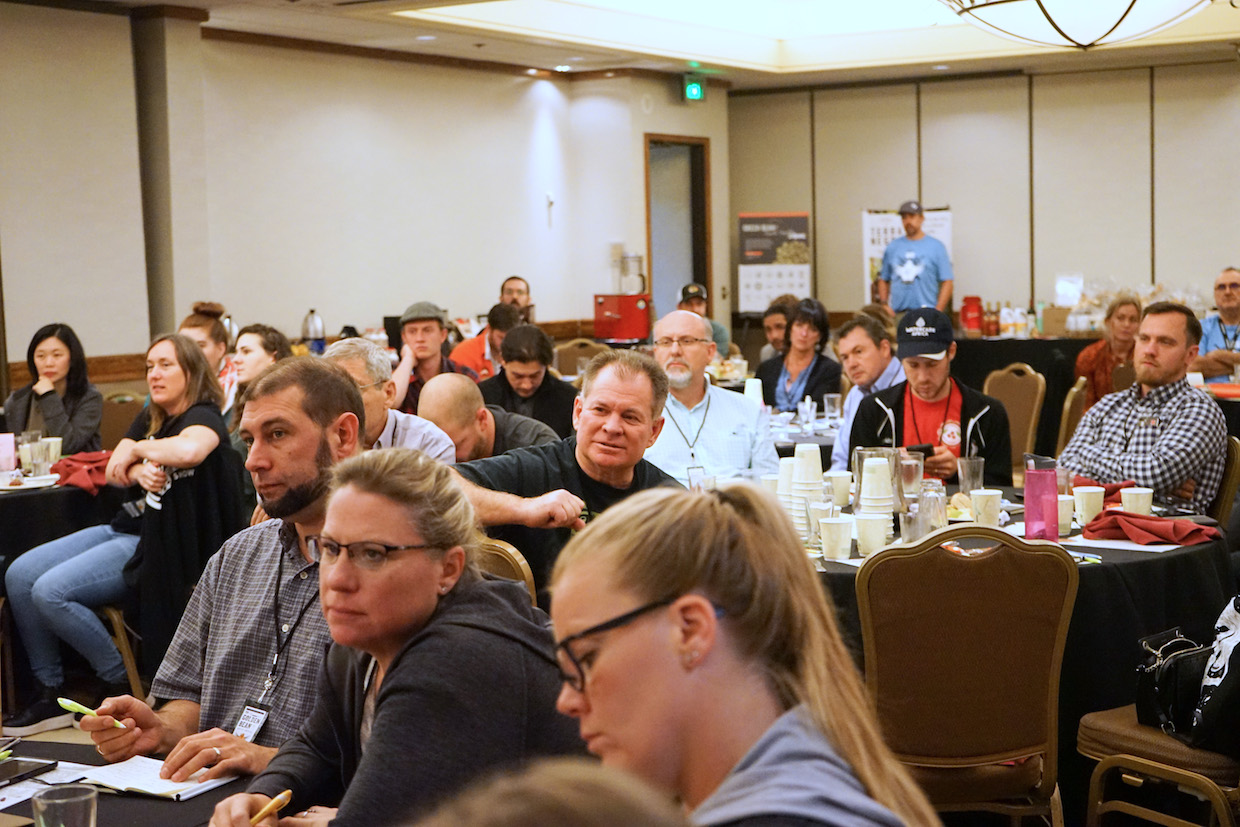With scores of roasters huddling together to taste hundreds of coffees at the recent Golden Bean roasting competition in Portland, Oregon, DCN seized the golden opportunity to ask a few questions — pulling the trier, as it were, from a drum full of thoughts and perspectives from professional coffee roasters.
We asked the same five questions of six different roasters representing four different corners of the USA and one from Australia, of experience levels from relatively new to seasoned, award-winning industry veterans. They are:
Adrian Capra of Art of Espresso, based in New South Wales, Australia
- Roasting experience spans 15 years
- Currently roasts on a Diedrich IR24 (transitioning to an IR30)
Brandon Bir of Crimson Cup Coffee, based in Columbus, Ohio
- Roasting experience spans 5 years
- Currently roasts on two Probat L12’s, one 60-pound-capacity machine made in Spain, and a two-barrel Probat sample roaster.
Emily Smith of World Cup Coffee, based in Portland, Oregon
- Roasting experience spans 6 months on a production-size machine and several years of sample roasting
- Currently roasts on a Diedrich IR-12
Deaton Pigot of Tectonic Coffee, based in Los Angeles, California
- Roasting experience spans 13 years
- Currently roasts on a 12-kilo Joper and an Ikawa sample roaster.
Calvin Patching of Five Rivers Coffee Roasters, based in Tillamook, Oregon
- Roasting experience spans 1.5 years
- Currently roasts on a 25-kilo Toper
Scotty Angelo of Oceana Coffee, based in Tequesta, Florida
- Roasting experience spans 9 years
- Currently roasts on a Giesen W15
We started off by asking each roaster what their most challenging bean has been. We followed that by inquiring as to each roaster’s favorite piece of work-related technology. Our third question explored each roaster’s favorite cold coffee drink, given the ever-rising profile of cold coffee in the industry today. Our fourth question was:
Outside of your own company and those you work directly with, what company or organization at any link in the chain do you most admire in coffee right now?
Calvin Patching: Di Bella, for their connection to people. I think that’s one of the biggest things in coffee culture. Even if the coffee itself doesn’t taste as good as it could, if the baristas are good and the suppliers are good — if the people I’m talking to work with me in building a connection and build a story around it — I’ll come back. Eighty percent of my decision to come back to a place is the connection. I still appreciate Starbucks [as an organization] for some of their marketing, but I think Di Bella took it to a creative twist. He found a niche. He stepped ahead of the game, found something unique, and worked it in such a way that cares for people, that really looks after his customers, his cafes that he’s working with. I really appreciate that.
Adrian Capra: Mike Nelson. What he’s doing, from what I’ve heard, to me that’s inspiring. He’s lifting the lid on a lot of things. I believe the industry needs that. Sadly it’s not a positive thing, but it will be, because otherwise there will be no industry.
Brandon Bir: I always like to work with TechnoServe, because the fact that they were in South Sudan is admirable, because I think there’s a lot of work to be done, and a lot of companies even larger companies have pulled out of that area. Going into high-risk places like that is admirable, Doctors Without Borders doing kind of the same thing in coffee-growing communities there. I’d say those two in particular, I admire what they’re doing.
Scotty Angelo: There’s organizations like Cafe Femenino; I think they do great work. The more I can find out about who is actually touching and being an actual contact on the ground, I’ll admire those for what they do.
Deaton Pigot: For customer service, we have a cafe that buys our coffee, called Kindness and Mischief, in Harlem Park. They’re just so welcoming and friendly to every single person that walks in that door. That door opens, and someone acknowledging them when they walk in, and it’s usually ‘Hi, friend.’ It’s really cool.
Emily Smith: I do some teaching with Mike Nelson of Junior’s Roasted Coffee, and the work that Junior’s is doing on sourcing and economic transparency, how they’re communicating that into the cafe is absolutely amazing. I feel constantly inspired by their work on economic sustainability and how to communicate economic sustainability into a value-added piece for a cafe consumer.
Howard Bryman
Howard Bryman is the associate editor of Daily Coffee News by Roast Magazine. He is based in Portland, Oregon.







Comment